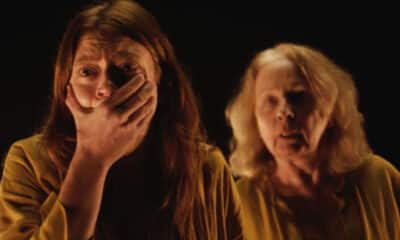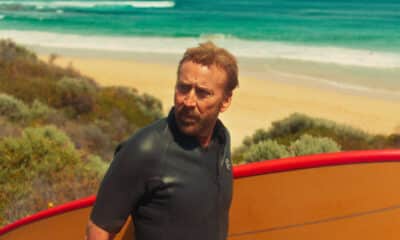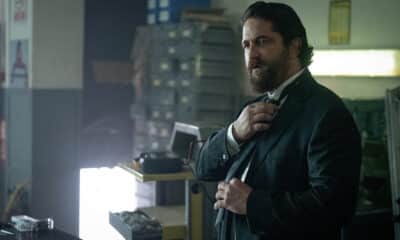
Their Finest is out to buy this week. Starring Gemma Arterton, Sam Claflin and Bill Nighy, it tells the story of British propaganda during the Second World War and the strong bond developed between people from all walks of life in the face of conflict.
This warm-hearted and intelligent film is co-produced by the legendary Stephen Woolley (of A Company Of Wolves and The Crying Game amongst others), who with Amanda Posey and Elizabeth Karlsen delved into the archives and uncovered the fascinating truth behind the celluloid war effort. We caught up with Stephen for an in-depth chat about the production…
THN: How did the project come to your attention?
Stephen Woolley: I was given the book (Their Finest Hour And A Half by Lissa Evans) and I loved it. The humour of it was exactly on my level. People were saying “You’d love it because it’s about old movies”, which is true. The BBC came on board, we’d produced Made In Dagenham and Great Expectations with them, and it really just blossomed from there.
We took a long time trying to get to the heart of the script because it was the story of a few characters, like a tapestry. It was a question of trying to find the right scenes for them. And the important thing as well was a lot of research went into it. I started to get quite fascinated myself! I realized that despite my enthusiasm I hadn’t seen these many of the films. So I set off…there were around 250-300 made during this period and I tried to watch every one of them, going into the archives. A lot of them were taped off the TV in the Eighties and Nineties, they were really hard to find. I was having collectors send them in… comedies and action pictures. Material about the Home Guard. It was a great process – I had a brilliant time to be honest, I love watching old movies.

So this was a combination of theatrical movies made at the time and propaganda pieces?
Well everything made at that time had to go across the desk of the Ministry of Information, which had to be approved. And they set up this company of filmmakers and producers… for example they made a film in 1943 called The Demi-Paradise with Laurence Olivier as a lovely Russian! Because Russia had just joined the war and they needed some propaganda to endorse them, everything before had been very anti-Russian. It’s very funny. Actually one of my favourites is Millions Like Us (also 1943), which was made to encourage women to go and work in factories, that’s a fantastic film.
They made all these short films which were pure propaganda, informational films. And they didn’t work. People thought they were boring. They didn’t want to be told what to do by people who were stars or who talked in very posh accents. The filmmakers had to realign what they were doing, and all these people like Michael Powell and Anthony Asquith, Sidney Gilliat jumped on board to create these films that would entertain and at the same time put out a message.
It was so different from propaganda in that sense, as we know it now. In those days it wasn’t really a dirty word. It became a dirty word during and after the war because of the way Germans used propaganda, it used to be an honest word. In fact, regarding the use of Dunkirk in the film, Churchill actually didn’t want anything made about that at the time. They were worried it was viewed as a retreat. Our film took the premise that they did decide to make a film about Dunkirk.
Was Millions Like Us, with its pro-female message, an inspiration for your film?
There is a short film that inspired The Nancy Starling (the fictional movie within Their Finest), which is a short film about a woman played by Peggy Ashcroft, who goes to help rescue her husband from Dunkirk (Channel Incident, 1940). It was interesting when Christopher Nolan’s movie opened because they are strong similarities, not that… our beach is less ambitious than his beach! But the idea of how Dunkirk became propagandized, to say it was a victory.
In the publicity the film looks bright and breezy but I found it quite subtle and intelligent. Is that down to the director Lone Scherfig?
Yeah. Lone did an amazing job, I think the fact she’s from Denmark and not the UK meant she was trying to make it from her perspective and pay tribute to those old movies she loved. Our great inspiration, apart from the script, was the cinema of that time, and that idea that no matter how bad things got you had to dig yourself out. The final act of the film – which I won’t talk too much about! – of what Gemma (Arterton)’s character had to go through, captures what was happening to people at the time.
We were trying to make a film that audiences today would like, but also one that might have been made at that time as well. There’s a parallel thing going on, the film within the film, and then our film. We got away with a lot of humour with the character of Ambrose (Bill Nighy) in that situation. A lot of those scenes look like they were made in 1943…
The footage from The Nancy Starling looks very authentic. Did you have fun recreating that era of moviemaking and those methods of production?
I enjoyed it very much. I read a lot of books about filmmaking during that period. We embraced the closeness of strangers, a group of people making something while there was a bloody war going on. They were away from the conflict but there was a spirit of camaraderie that was going through the country at the time. What people maybe don’t understand is that the war was terrible but it brought together all classes, all sexes. Everyone was saying things like “I don’t care if you’re a woman and you drive a truck”.

The film is an ensemble but it has three big names at the top – Gemma Arterton, Sam Claflin and Bill Nighy. How did you come to cast the lead characters?
Well I’d worked with Gemma before on Made In Dagenham The Musical and also Byzantium. I’ve always been a fan of hers. Lone had wanted to cast Gemma in a few movies but it had never worked out. I knew Bill a bit socially and I love Bill, I was desperate to work with him so he was my number one choice for Ambrose. I was thrilled he loved the script. And Sam… I really liked The Riot Club, the film Lone had made and I suggested him to her. She thought he was maybe too young but even though he’s a young guy Sam has one of those faces. He’s got this weight in his eyes… he’s a bit of a bloke. He’s not like Benedict Cumberbatch, he’s a different type of actor, more in that Forties mould. We lucked out, we got all the people we wanted. And of course we had a great supporting cast: Jeremy Irons, Helen McCrory, Richard E. Grant, Paul Ritter…
How has your view of the industry, particularly the UK film industry, changed over the decades…?
We’re still making films, which is good news! People are still going to the cinema. But television is being watched more than ever, it’s come of age. Many movie directors are now working for Netflix, Amazon… there’s not the same delineation that there was. I think a lot of the films that I’ve made, like A Company Of Wolves and The Crying game, would probably be made for TV now. In those days you had the ‘X’ certificate. Imagine A Company Of Wolves now… you could show it to a twelve year-old, without them even blinking! So there’s been a big sea change and we’ve got to fight really hard to really preserve cinematic drama, like with The Limehouse Golem, which I’ve got coming up with Bill Nighy again. You have to remember that you’re making cinema and not television. You need money for period film and to make it work in the cinema. I’m always conscious of that medium. You’ve got to make your mark. There’s still a big audience for it.
Steve is a journalist and comedian who enjoys American movies of the 70s, Amicus horror compendiums, Doctor Who, Twin Peaks, Naomi Watts and sitting down. His short fiction has been published as part of the Iris Wildthyme range from Obverse Books.

Latest Posts
-


Film Reviews
/ 3 days ago‘Fear Street: Prom Queen’ review: Dir. Matt Palmer (2025)
It has been four years since Leigh Janiak’s Fear Street trilogy took horror fans...
By Kat Hughes -


Film Reviews
/ 3 days ago‘The Surrender’ review: Dir. Julia Max (2025)
As Julia Max’s debut feature, The Surrender, unfolds, the inspirations for the film become...
By Kat Hughes -


Film Trailers
/ 4 days agoFirst trailer for Darren Aronofsky’s ‘Caught Stealing’
Sony Pictures has released the debut trailer for Darren Aronofsky’s new film Caught Stealing,...
By Paul Heath -


Film Reviews
/ 6 days ago‘Lilo and Stitch’ review: Dir. Dean Fleischer Camp (2025)
Director Dean Fleischer Camp won audiences over with the fantastic Marcel the Shell with...
By Kat Hughes







